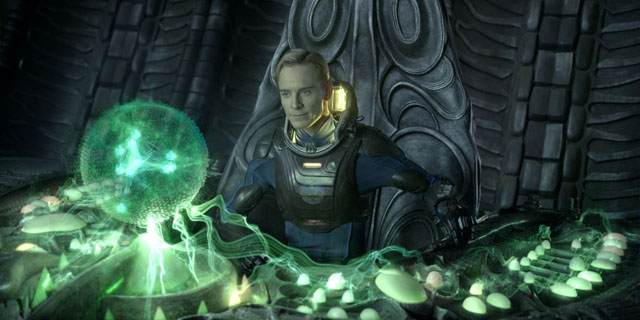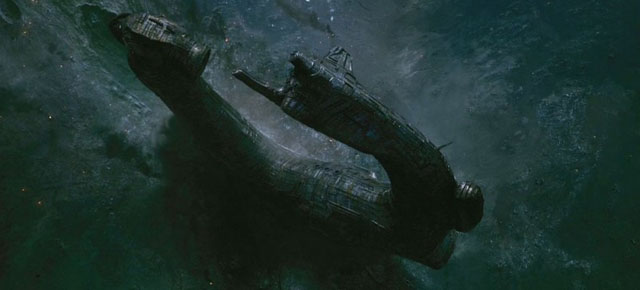Have the trades broken an embargo on reviews of Ridley Scott’s highly anticipated not-an-Alien-prequel, Prometheus? As Ryan Adams reminds us at Awards Daily, “nothing much happens in Hollywood by accident.” So we begin with (and we’ll return to) Justin Chang in Variety: “Elaborately conceived from a visual standpoint, Ridley Scott’s first sci-fier in the three decades since Blade Runner remains earthbound in narrative terms, forever hinting at the existence of a higher intelligence without evincing much of its own.”
“Presuming that humans won’t rest until we discover where we came from and how we got here, Prometheus proposes that not very long from now, in 2093 to be precise, a plausible source of human life will not only be found but reached by space explorers backed, not surprisingly, by private, not government, interests,” explains Todd McCarthy in the Hollywood Reporter. “The striking opening sequence (shot in Iceland) reveals scientist Elizabeth Shaw (Noomi Rapace, the original Girl With the Dragon Tattoo) discovering ancient cave paintings indicating the likely arrival on Earth of extraterrestrials many thousands of years ago. Such evidence points to the source as a moon in a small solar system a vast distance away, but not out of reach of a trillion-dollar spacecraft built by Weyland Industries. The buildup and arrival are the best part of the film, suggesting a sense of inquiry and genuine sort of thoughtfulness that promise a truly weighty slice of speculative fiction. Not that this territory hasn’t been amply mined in the past: In fact, the particulars of the ship’s interior design, visual projections, hibernating crew members, sports workout routines and Michael Fassbender’s robot character as a sort of ambulatory HAL with an obsession to look and speak like Peter O’Toole in Lawrence of Arabia, which he likes to watch, are unavoidably reminiscent of 2001: A Space Odyssey. Little by little, however, elements of other, less philosophical films come into play, including Fantastic Voyage, Rosemary’s Baby and, inevitably, Alien.”
“Yet a key difference between this film and its predecessor is one of volume.” Justin Chang: “Incongruously backed by an orchestral surge of a score, the film conspicuously lacks the long, drawn-out silences and sense of menace in close quarters that made Alien so elegantly unnerving. Prometheus is one chatty vessel, populated by stock wise-guy types who spout tired one-liners when they’re not either cynically debunking or earnestly defending belief in a superior power. The picture’s very structure serves to disperse rather than build tension, cross-cutting regularly between the underground chamber, where two geologists (Sean Harris, Rafe Spall) meet an ugly end, and the ship, where efforts to contain the threat are thwarted by the increasingly uncertain chain of command.”
Alien “was a film that embraced its horror-in-space format,” writes Screen‘s Mark Adams. “While Prometheus has some striking chilling moments it never plays the all-out horror card, instead developing the science alongside the action and punctuating the film with moments that jolt and amaze.”
Just about every day, starting today, Prometheus will be opening in a fresh handful of countries—France today, tomorrow: Azerbaijan!—until it finally opens in the States on June 8. The drum-rolling’s been going on for months, of course, with the usual teasers and virals, but what may be most interesting about this particular campaign is the emphasis on reevaluating, or perhaps more to the point, demanding appreciation for Ridley Scott as an auteur—the sort of appreciation many cinephiles would be more willing to grant his brother, Tony. The interviews and profiles, such as Cath Clarke‘s for Time Out London or Tim Walker‘s for the Independent, are to be expected, but a retrospective at the Film Society of Lincoln Center? Seems like an odd way to allocate resources. Nonetheless, Past and Prologue: The Films of Ridley Scott is on through June 3.
Still, to listen to the BBC’s Mark Kermode discuss his own top five Ridleys (5’01”) is to be reminded that Scott has left his mark on more than science fiction—for better (Thelma and Louise; see Sheila Weller‘s piece on its making for the March 2011 issue of Vanity Fair) and for worse (Black Hawk Down). And in a magnificent April Fool’s Day issue, “Great Scott!,” Reverse Shot ran a round of “raves” for a few memorable misses. E.g., Michael Koresky: “The film was A Good Year, and oh what a good year it was—for cinema.”
Michael Sragow, blogging for the New Yorker yesterday: “Despite making one disappointing movie after another, Scott has a visual ambition and a yen for grandeur that make each new production seem like an occasion. When working on a vast scale for a wide international audience, he’s rarely lost his painterly signature. A film like 1492: Conquest of Paradise may be one huge objet d’non-art, but most of the time, even if a Scott production like Kingdom of Heaven fails to ignite dramatically, it contains alluring filigree.” Eventually, he works his way to “Scott’s gorgeous and thrilling film debut, The Duellists, from 1977… Think of Barry Lyndon as if paced by Howard Hawks.”
But back to Prometheus. As more reviews come in, I’ll be making note of them here. For now, see Damon Wise‘s piece in the Guardian on what it was that made Scott want to revisit the world of Alien: “it came from an image, glimpsed at the beginning of the film, when the crew of the Nostromo board a derelict cargo ship.” And by the way, Scott’ll be returning to Blade Runner as well.
Updates: “There’s too much to process in a first viewing of Ridley Scott’s Prometheus,” writes the Telegraph‘s Tim Robey, “some of it good, some of it great, almost all of it mental. How the movie fits together—both internally, and in sequence with the Alien series Scott launched in 1979—are questions its core audience will come out fiercely debating: those who’ve managed to keep down their dinner, anyway.” Prometheus “retraces the steps of the original movie, beat by beat, to tell its own tale, one screenwriters Jon Spaihts and Damon Lindelhof underline for us constantly (a bit crudely, to put it mildly) as a quest for meaning in the universe.”
The Guardian‘s Peter Bradshaw: “Ridley Scott has counter-evolved his 1979 classic Alien into something more grandiose, more elaborate—but less interesting. In place of scariness there is wonderment; in place of tension there is hugely ambitious design; in place of unforgettable shocks there are reminders of the original’s unforgettable shocks. There are also some shrewd and witty touches, and one terrifically creepy performance from Michael Fassbender, who steals the film with the chilling, parasitic relentlessness of that first gut-bound alien.”
Viewing (4’28”). FirstShowing‘s Alex Billington and SlashFilm‘s Peter Sciretta discuss their initial reactions. More viewing (4’06”). The Guardian talks with Scott and Noomi Rapace. More (1’32”). The BBC gets a few words with Charlize Theron.
Updates, 5/31: “Scott’s return to sci-fi is by no means an unmitigated disaster,” writes Brian Clark at Twitch: “it’s visually stunning, well-paced, icky, intense and even thoughtful at times. In fact, It’s one of the most satisfying huge-budget studio genre movie to hit theaters in years. But unfortunately, none of the visual pizazz and nausea-inducing special effects can mask the well-trodden ground that the plot covers or the fact that the script becomes noticeably clunky during the second half. These problems don’t sink the film, but they’re incredibly frustrating because Scott lays the groundwork for something much more intense and thought-provoking than he actually delivers.”
At the Playlist, Oliver Lyttelton finds that “for much of the running time, it works, but eventually something has to give, and the film ends up with the two aims cancelling each other out, ending up as neither a thought-provoking 2001-esque science-fiction epic, nor a rollicking horror-tinged tentpole. There’s an awful lot to like, but it’s not a film that coheres terribly well.”
Updates, 6/1: “Damon (Lost) Lindelof and John Spaihts’s screenplay is canny in all senses,” writes Nigel Andrews in the Financial Times. “It is skilfully, opportunistically crafted. It is full of can-do moments empowering the digital special effects (monsters and machines that use or cannibalise H.R. Giger’s marvellous old designs). And, broadly, it could have come from a can. Freshness here is as rare as air.”
“The script feels flat,” agrees Tom Huddleston in Time Out London: “a few pleasing nods to the original movies aside, the dialogue is lazy, while the plot, though crammed with striking concepts, simply fails to coalesce. After an enjoyable setup, the central act is baggy, confusing and, in places, slightly boring, while the climax has flash and fireworks but no real momentum.”
“Scott hasn’t reinvented the genre or somehow managed to explain the metaphysical mysteries of existence by the end of the final reel,” writes Geoffrey Macnab in the Independent. “Prometheus probably won’t achieve the cult status of earlier Scott movies like Blade Runner and Alien. However, if this is just another sci-fi movie, it’s certainly a rousing and very entertaining one.”
More from Matt Mueller (Thompson on Hollywood) and Adam Sweeting (Arts Desk).
Update, 6/2: “Beneath the hype and promises,” writes James Rocchi for Box Office, “it’s almost a letdown that the actual film is merely very good: a better-than-average 3D big-budget space tale…. We live in a dim and dark era when Michael Bay’s idiot fantasies of moralistic robot trucks or the simple metaphors of Battle: Los Angeles are considered ‘science fiction.’ Let Prometheus be a reminder that a real science-fiction film this superbly-made, smart and satisfying throws off the light and heat of a fire stolen from heaven.”
Updates, 6/4: “What might frustrate some fans,” writes David Cairns, “is the fact that the film doesn’t really set out to provide answers to the new questions it poses, though it does give information about the nature of the ‘Space Jockey’ species found dead in Alien, and the origins of the titular creature itself. Those are questions that nobody really needed answers to, so the new mysteries we’re left with are much more intriguing. And I kind of hope they remain unanswered, but I guess there’s little chance of that—there’ll be a 2010-style sequel along sooner or later to explain everything to death.”
Filmmaker‘s Scott Macaulay interviews screenwriter Jon Spaihts and, for Movies.com, Anthony Pascale talks with his screenwriting partner, Damon Lindelof. Then there’s Eric Spitznagel‘s interview with Scott for Esquire, wherein he mentions that he’s already working on a film about Moses.
Update, 6/5: Aaron Balick subjects Alien to “a Kleinian analysis…. Melanie Klein was a psychoanalyst who took Freud’s thinking and moved it into new and exciting (and some might say rather bizarre) directions.” Via Catherine Grant.
Updates, 6/6: “Prone to shallow ponderousness, Prometheus works best when it steps back from contemplating the cosmos to enter the domain of flesh-and-blood and hereditary terror,” writes Nick Pinkerton in the Voice. “There are a few set pieces here that will find a place of honor among aficionados of body horror and all things clammy and viscous, that will stain the memory long after such significant-sounding bits of dialogue like ‘That being said, doesn’t everyone want their parents dead?’ have gone.”
John Semley for Slant: “It aspires to Stanley Kubrick’s 2001, but in its maddeningly unresolved plot threads and cornball cosmic mysticism, it lands closer to Mission to Mars—though Prometheus lacks any action set piece as gripping as the Brian De Palma film’s sentient sandstorm.”
Movieline‘s Stephanie Zacharek: “Scott vests the movie with an admirable degree of integrity—it doesn’t feel like a cheap grab for our moviegoing dollars—but it doesn’t inspire anything so vital as wonder or fear, either. Prometheus has been one of the most anticipated pictures of the summer, but its lackluster payoff is summed up perfectly by one of its chief characters, a scientist who travels a long way from Earth in the hope of meeting the allegedly superior beings who created us humans: ‘This place isn’t what we thought it was.'”
Lily Rothman talks with Fassbender for Time.
“No other recent science-fiction film, with the sole exception of Avatar, has created such a textured, detailed and colorful vision of the human space-traveling future, and indeed it’s reasonable to assume that Scott conceives of Prometheus as a pessimistic counter-argument to James Cameron’s eco-parable on various levels,” writes Salon‘s Andrew O’Hehir. “I’m generally in tune with the mordant philosophy that seems to be expressed in Prometheus: If you think the human race are assholes, wait till you see who made us! But it’s enclosed, in this case, in a shiny-looking vehicle that becomes more and more like your average horror-chase movie as it goes along, channeling not just the entire Alien series but also Blade Runner and Avatar and John Carpenter’s The Thing. But what Prometheus resembles most strongly, if perhaps accidentally, is Terrence Malick’s The Tree of Life, as unlikely as that sounds. Both are grand statements of artistic purpose, and searches for the beginning of time and the meaning of life. Both are obsessed, even hypnotized, by the unmatchable spectacle of Stanley Kubrick’s 2001, the greatest of all murky sci-fi allegories. Both will be avidly defended by fans and viciously derided by detractors. Both are mightily impressive spectacles that will maybe, kinda, blow your mind, en route to a hip-deep swamp of pseudo-Christian religiosity.”
For Slate, Tom Shone considers “the cottage industry of analysis that has sprung up around Alien” and offers a bibliography.
Updates, 6/7: “Mr. Scott’s sense of visual scale, which has often produced hectic, hectoring grandiosity (are you not entertained?), achieves, especially in the first hour, something like genuine grandeur.” A.O. Scott in the New York Times: “But the virtuosity on display makes the weakness of the story… all the more frustrating…. There are no revelations, only what are called, in the cynical jargon of commercial storytelling, ‘reveals,’ bits of momentarily surprising information bereft of meaning or resonance. For example: A sequel is coming.”
Ray Pride for Newcity Film: “Prometheus is a glorious triumph of cinema as spectacle, of movies as atmospheres and quicksilver instants of human reaction and bombastic bursts of large-scale action and sound and symphony. As a traditional commercial movie? For those expecting fully explored themes, rather than jabs of implication, or dynamically structured exposition and traditionally paced emotional catharsis, from one of the most gifted art directors who ever became a film director, it may turn out to be something else altogether.” And he elaborates.
Prometheus “is the best-looking stupid movie I have seen all year,” writes the Philadelphia Weekly‘s Sean Burns. “It’s sumptuously photographed, and most often inane.”
Paul Constant in the Stranger: “In a few scenes, Scott has clearly handed the reins to studio heads who doubt the audience’s ability to handle adult issues—not since the 1960s has a screenplay struggled so awkwardly to avoid saying the word ‘abortion,’ for instance—but the fact that this is a summer blockbuster powered by existentialism should not be glossed over.”
“There’s a sense in which Prometheus is, believe it or not, a movie about movies, or at least about visual storytelling,” suggests Glenn Kenny at MSN Movies. “David wears a ‘near visor’ that allows him to see the dreams of crew members in hypersleep; these dreams are rendered in what looks like a high-tech version of pinscreen animation. The backstory of the alien race that gave rise to the acid for blood creatures is conveyed through holographic records that reenact the race’s history before the eyes of the human explorers. And so on.”
For Tasha Robinson, writing at the AV Club, “by the end, when it breaks down into a standard blockbuster action thriller, Prometheus sometimes gets damn silly, particularly during an impromptu medical procedure that seems intended as a Cronenbergian body-horror moment, but heads so far into unlikely territory that it’s difficult to take seriously…. Until that frantic last act, Prometheus is essentially an abstract remake of Alien for contemplative grown-ups.”
“Adjust those expectations,” suggests Jason Shawhan in the Nashville Scene, “and it’s still provocative and visually arresting.”
For the NYT, Mekado Murphy has production designer Arthur Max comment on a slide show.
Updates, 6/11: J. Hoberman for Artinfo: “The android not only has the movie’s only sense of humor and most madcap special effect, but also precipitates its most sublime moment when, having figured out how to manipulate the aliens’ space console, he (it?) sets off an elaborate ghost sonata that’s all the more sinister for being sprinkled with Disney dust.”
Tom Shone: “Trust Scott to mistake a beautiful detail for an entire movie: his films are nothing but details.”
“Scott might be the most overrated director alive, but he’s decent at slower tempos,” offers New York‘s David Edelstein.
More from Ty Burr (Boston Globe), Sebastian Clare (Film International), Evan Davis (Cinespect), David Denby (New Yorker), Roger Ebert (Chicago Sun-Times), Peter Hall (Movies.com), Robert Horton (Herald), Jonathan Kiefer (Faster Times), Richard Lawson (Atlantic Wire), Michael Phillips (Chicago Sun-Times), Dana Stevens (Slate), Jim Tudor (Twitch), and Kenneth Turan (Los Angeles Times).
FirstShowing‘s Alex Billington interviews Fassbender and Scott, while Steven James Snyder talks with Lindelhof for Time.
There’s been a flurry of pieces written for those who’ve seen Prometheus by this point, of course, all of them addressing supposedly unanswered questions: Kyle Buchanan and Amanda Dobbins (Vulture), Christopher Campbell (Movies.com) and Jen Yamato (Movieline).
For news and tips throughout the day every day, follow @KeyframeDaily on Twitter and/or the RSS feed. Get Keyframe Daily in your inbox by signing in at fandor.com/daily. .










